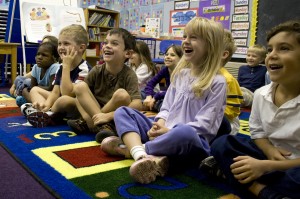Mandatory Kindergarten Falls Off This Year’s Legislative Docket
Legislation before the General Assembly this session sought to make kindergarten mandatory for Hoosier children by lowering the compulsory school age from seven to five.
It’s an issue that has lawmakers and educators split, even as the state focuses on funding early education initiatives.
- Does the Early Bird Really Catch The Worm? Indiana Public Broadcasting’s Eric Weddle reports on the issue of mandating kindergarten – a topic that has lawmakers and educators split, even as the state focuses on funding early education initiatives.Download
‘Kindergarten Is The New First Grade’
These are the some of the more than 60 skills five-year-olds are expected to learn now in Indiana’s public kindergartens:
- Count to 100 by ones,
- Solve real-world problems that involve addition and subtraction, and
- Understand how a nonfiction book is organized.
They’re the same skills that could cause a student to struggle during first grade if they haven’t been exposed to them earlier.
“I am hoping they are going to be able to read and write and do their math and be able to count and recognize numbers,” says Karen Berman, a 24-year kindergarten teacher at Greenbrier Elementary in Washington Township. “We are doing a lot with number sense and it’s unbelievable.”
Students in Berman’s class use interactive technology, shout out fractions during group number games and learn how the government works.
Kindergarten, Berman says, is the new first grade.
“I think you have to mandate kindergarten,” Berman says. “What difference does it make if you put them in pre-k and they don’t go any further? And then go to first grade – they are still going to be behind. Yes, you have to have the pre-k, there is no question about it, but you have to mandate kindergarten.”
Compared to the rest of the nation, Indiana is not out of step. Only fifteen states require children to attend kindergarten at age five ,and thirty-five states (including Indiana) don’t require kindergarten at all, according to the Education Commission of the States.
This year, state Superintendent Glenda Ritz and the Indiana State Teachers Association made mandatory kindergarten one of their top legislative priorities. But two bills to do just that never even made it out of committee.
What Do Lawmakers Think?
House Education Committee Chairman Bob Behning, R-Indianapolis, says there is no need to lower the compulsory school age from seven to five, because most children already attend classes at age five – and parents should have the choice whether or not to send them.
“I just don’t see it as quite a big an issue as maybe some do because of the 97 percent attendance,” Behning says.
So, do early all Indiana kids attend kindergarten? That depends on who is doing the counting and how.

House Education Committee Chair Bob Behning (right) takes attendance at a meeting of the Indiana General Assembly. (Photo Credit: Kyle Stokes/StateImpact Indiana)
Behning’s estimate used state Department of Education data, using the simple difference between first graders enrolled in 2014 and kindergarteners enrolled in 2013. But that data that doesn’t include schools not accredited by the state or homeschooled students.
A recent report by Education Week came up with a very different estimate. Using the Current Population Survey from the U.S. Bureau of Labor Statistics, the EdWeek report found less than 74 percent of eligible Hoosier children were enrolled in kindergarten programs in 2013 – a rate that puts Indiana near the bottom of the country for kindergarten enrollment.
“Really what it comes down to is there are people who are still in the state of Indiana, legislators who make laws, that don’t believe we should be in the business of telling parents when to send their child to school until they are at least seven,” says state Senator Greg Taylor, D-Indianapolis, who authored of one of the kindergarten bills. “Whereas we all know, the kids who go to pre-k and kindergarten actually have more success.”
Taylor says there is a disconnect among lawmakers who support the On My Way Pre-K pilot program but reject debate about the merits of lowering the mandatory age for school,
But Behning disagrees. He’s says the ongoing investment in pre-k is proof the state is making strides in early education.
“If you are going to take advantage of the preschool option, you are going to take advantage of kindergarten,” Behning says. “Obviously we don’t want to have the successes we get in preschool and have them walk away. Logically, that is not going to happen anyway.”
What Do Experts Think?
Indiana University professor of early childhood education Mary McMullen understand lawmakers’ differing opinions. She is also torn on the issue.

Indiana is one of thirty-five states that does not mandate kindergarten. (Photo Credit: Corie Howell/Flickr)
On one hand, McMullen worries for the children left at home in front of a television with a family member. But on the other, she questions whether Indiana is ready for such a change – does the state even have enough qualified early education teachers?
“The whole birth to age six to seven has to be reconsidered in this state and we are doing many, many fine things,” McMullen says. “Before we tread into requiring kindergarten, or before we know what that either means or who would be in charge of the kindergarten curriculum. I recommend against it.”
No matter what happens with state policy, kindergarten teacher Karen Berman says she and other teachers will strive to teach and nurture their students.
“The bottom line is we want them all to be successful and have self-confidence,” Berman says. “The only way you are going to have self-confidence is if you can achieve certain goals. As long as we make sure that they have a solid foundation that other teachers can build on – that’s the goal.”

